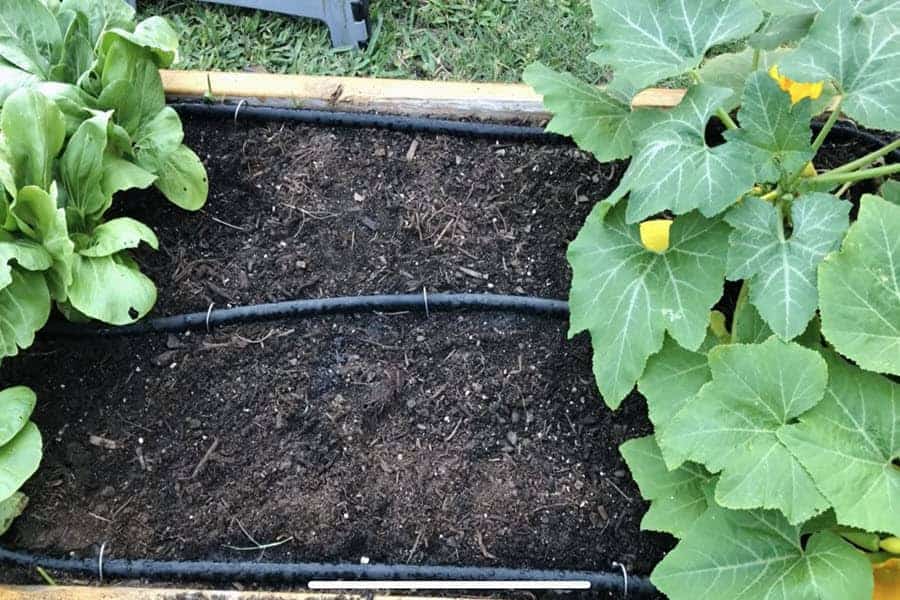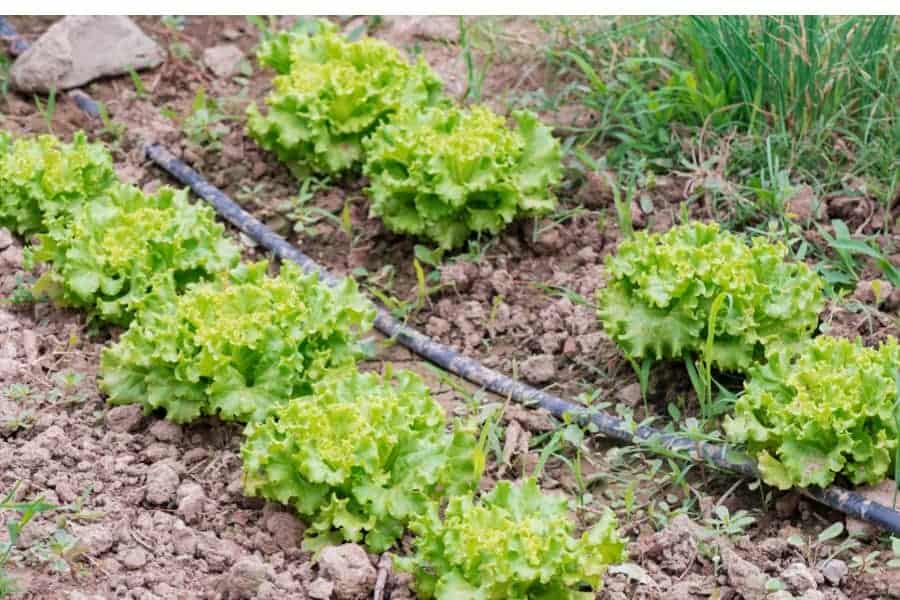
Soaker hoses are undoubtedly the best in the business. They are time-efficient, economical, and conserve water. However, what concerns gardeners is the recycled tires rubber most soaker hoses are made of. It makes them a potential carrier for heavy metals and other harmful chemicals to the soil. So, are soaker hoses really safe for vegetable gardens?
Crumb tire soaker hoses contain harmful compounds, but whether your plants take enough of them to produce toxicity will depend on several factors. It includes soil pH, type of plant, temperature, the chemical composition of irrigation water, and the size of the rubber particles.
Since many are skeptical about using soaker hoses for their edible crops, we thought of writing a standalone article discussing every crucial aspect of it. The following sections discuss soaker hoses and if they are safe, the best non-toxic alternative, and some safety tips for using them.
The Truth About Soaker Hoses and Chemical Toxicity
Most standard off-the-shelf soaker hoses are made from fine-crumb rubber, usually recycled from vehicle tires. Tires are known for housing chemicals, including heavy metals, carcinogens PAHs, VOCs, mutagenic toxins, and more. Most of these compounds are indeed harmful and can leach into the soil.
Moreover, if you look at the manufacturing label on the back of the product, you will likely find a warning that reads – do not drink water from the hose or California Proposition 65 warning.
Despite the availability of potentially hazardous compounds in the soaker hoses, they aren’t studied for toxicity in edible crops.
To get a clear picture, let’s take a product relative to soaker hoses that researchers have shown interest in. Rubber infill and mulches are the soft, crumbly granules used in playgrounds for cushion falls. They are made from ground-up recycled tires. And unsurprisingly, studies have found the presence of harmful substances in it – such as PAHs, VOCs, heavy metals, etc.
When asked how safe rubber mulch is at playgrounds. Researchers from the United States Environmental Protection Agency conclude – that the toxins from the mulch might leach into the groundwater. But they aren’t likely to pose an alarming public-health issue for people. Many believe that the chemicals in rubber infill are often present in a small concentration; therefore, they don’t cause any severe harm.
So, does that mean soaker hoses are safe for watering vegetable gardens? Let’s find out!
How Safe Are Soaker Hoses For Growing Veggies?

As we know, soaker hoses aren’t studied for increasing the toxicity in edible plants. Even on the internet, you will barely find any information discouraging the use of soaker hoses. However, it doesn’t necessarily make them toxin-free.
The truth is: soaker hoses made from recycled tires do contain chemicals. They are often found with high levels of zinc which is known for inhibiting plant growth.
In a worst-case scenario, if your soaker hoses are indeed leaching zinc and other heavy metals in the soil. Whether your crops take enough of these nasty compounds to be toxic depends on – soil PH, temperature, plant species, size of the rubber particles, and the chemical composition of the water.
Since several interrelated factors are involved, we can’t give you a clear-cut answer on whether soaker hoses are safe for edible plants. But check this out:
Studies on vegetables grown in contaminated soils show that some plants uptake lead, cadmium, and PAHs. However, the amounts are generally low and below the established health standards.
Now, this should give you a sigh of relief. But in case you find your vegetation degrading and suspect soaker hoses to be a potential cause for it, test your native soil for nutrient composition and heavy metals. If your soil already contains elevated levels of heavy metals, using soaker hoses might exacerbate the problem.
Best Non-Toxic Soaker Hose for Vegetable Gardens
When you are not convinced about soaker hoses being a safe choice for your edible plants, go for a food-grade polyurethane soaker hose.
A 2016 study by Ecology Center found that hoses made of PU material – those labeled drinking-safe – are generally devoid of lead and less on other nasty chemicals. Soaker hoses made of polyurethane are undoubtedly the safest alternative to PVC and recycled rubber.
If you are in a hurry or don’t have time to Google search all day, the following is one of the best soaker hoses for organic gardeners.
Gardener’s Premium 1/2″ Soaker Hose
Made from FDA-grade polyurethane, Gardener’s Premium is an NSF-certified soaker hose designed for the drinking-water grade. It’s free of toxins like phthalates, BPA, and lead, making the hose ideal for vegetable gardens.
The best thing about this product is the UV-resistant polyurethane that prevents it from degrading and getting brittle in the sun. This soaker hose from Gardener’s Supply Company comes in brown color and has three sizes available. It’s durable, conserve water, and weeps uniformly.
This product is comparatively expensive for a standard rubber hose. But, if you are adamant about peace of mind and don’t want to deal with potentially toxic counterparts, simply go for it. You will notice that its attributes make up for the upfront cost in the long run.
Cons:
- Due to relatively bigger holes, at high pressure, the hose tends to spray water into the air unless it’s covered with a layer of compost mulch.
- Hard or mineral-rich water tends to cause a build-up in the hose. To prevent it, you will need a hose carbon filter.
NOTE: Hoses marketed as drink-safe are not completely chemical-free. It simply means they’re low on lead, not on all other toxins.
Tips On Getting The Best Out of Soaker Hoses
- Before using new hoses, run them with high-pressure water for at least 5 minutes.
- After removing the hose from the water source, fit the cap into it to ensure no soil or insects goes into it. It prevents clogging.
- Keep your soaker hose covered with a layer of 2-3 inches of mulch. It helps retains moisture, reduces evaporation, and protects your hose from sun damage.
- Initially, run your hose for at least 30 minutes twice a week. After watering day, check your soil, see if moisture has dripped several inches, and adjust accordingly. Once you find the magic number for your soil conditions, set it on a timer and run the water for the fixed minutes each time.
- Ideally, don’t apply high water pressure. It enlarges the holes of the soaker hose, causing them to leak into the sky.
Related Questions
Q. Can you bury the soaker hose?
It’s not suggested to bury your soaker hoses under soil unless they are designed for that purpose. Or you may end up clogging its pores.
Q. Are soaker hoses worth it compared to sprinklers?
A sprinkler hose combines the features of a soaker hose and a water sprinkler.
But if your priority is conserving water, go for soaker hoses, as they are more efficient than automated sprinklers.
Q. How long do soaker hoses last?
A standard crumb tire soaker hose typically lasts one to two years. However, it may vary depending on the frequency of use, how often you expose them to direct sunlight, and how they are maintained when not in use.
Final Words
In a nutshell, we don’t know how dangerous recycled tire soaker hoses are for our vegetable gardens. Due to the lack of scientific research, the risks remain unclear.
It’s apt to admit that this day and age we live in is full of risks, at least to a certain extent. It’s impossible to avoid all toxic exposures.
